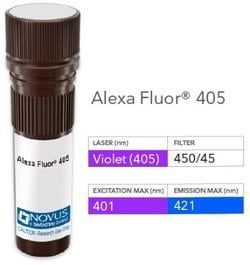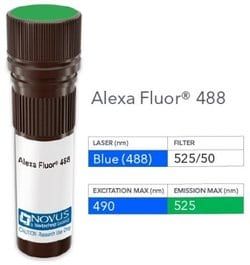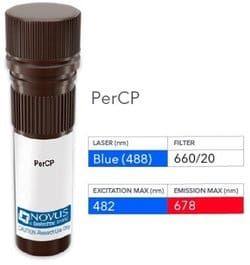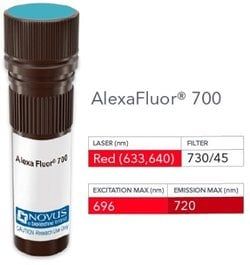Thyroglobulin Antibody (6E1), Alexa Fluor™ 405, Novus Biologicals™
Manufacturer: Novus Biologicals
Select a Size
| Pack Size | SKU | Availability | Price |
|---|---|---|---|
| Each of 1 | NBP233096W-Each-of-1 | In Stock | ₹ 57,494.00 |
NBP233096W - Each of 1
In Stock
Quantity
1
Base Price: ₹ 57,494.00
GST (18%): ₹ 10,348.92
Total Price: ₹ 67,842.92
Antigen
Thyroglobulin
Classification
Monoclonal
Conjugate
Alexa Fluor 405
Gene Alias
AITD3TGN, TDH3, Tg, thyroglobulin
Host Species
Mouse
Molecular Weight of Antigen
660 kDa
Quantity
0.1 mL
Research Discipline
Cancer, Cell Biology
Gene ID (Entrez)
7038
Target Species
Human, Mouse, Rat
Form
Purified
Applications
Western Blot, Flow Cytometry, Immunohistochemistry (Paraffin)
Clone
60
Dilution
Western Blot, Flow Cytometry, Immunohistochemistry-Paraffin
Gene Symbols
TG
Immunogen
Thyroglobulin isolated from human thyroid glands was used as the immunogen for the antibody.
Purification Method
Protein A or G purified
Regulatory Status
RUO
Primary or Secondary
Primary
Test Specificity
Thyroglobulin is a 660kDa dimeric pre-protein with multiple glycosylation sites. It is produced by and processed within the thyroid gland to produce the hormone thyroxine and triiodothyronine. Prior to forming dimers, thyroglobulin monomers undergo conformational maturation in the endoplasmic reticulation. The vast majority of follicular carcinomas of the thyroid will give positive immunoreactivity for anti-thyroglobulin even though sometimes only focally. Poorly differentiated carcinomas of the thyroid are frequently anti-thyroglobulin negative. Adenocarcinomas of other-than-thyroid origin do not react with this antibody. This antibody is useful in identification of thyroid carcinoma of the papillary and follicular types. Presence of thyroglobulin in metastatic lesions establishes the thyroid origin of tumor. Anti-thyroglobulin, combined with anti-calcitonin, can identify medullary carcinomas of the thyroid. Furthermore, anti-thyroglobulin, combined with anti-TTF1, can be a reliable m
Content And Storage
Store at 4C in the dark.
Isotype
IgG1 κ
Description
- Thyroglobulin Monoclonal specifically detects Thyroglobulin in Human samples
- It is validated for Immunohistochemistry, Immunohistochemistry-Paraffin.





